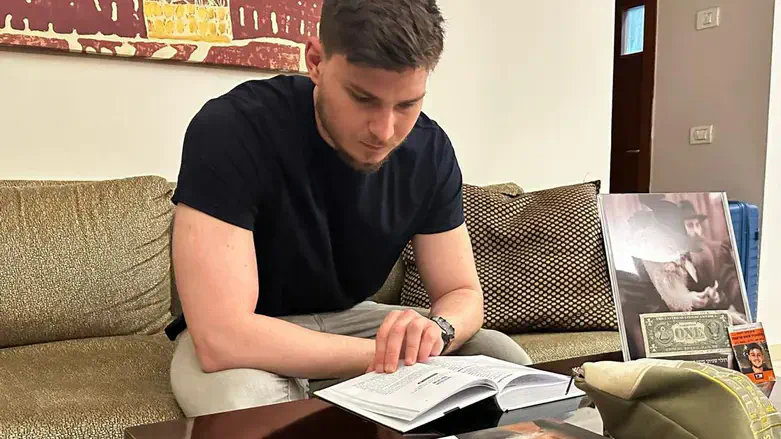
In a rare and deeply moving interview, Sasha Troufanov, a survivor of captivity in Gaza, has spoken for the first time about the profound hardships he endured during his time in captivity and the unexpected spiritual journey that sustained him.
In the interview for the Kfar Chabad weekly, Troufanov reveals the physical and emotional trials he faced, his spiritual awakening, and his renewed perspective on life and freedom.
“I had almost no control over anything,” Troufanov said, reflecting on the severe limitations and deprivations he endured. “Many times my life was in danger, and I was miserable. I could have succumbed to despair, but each time I reached a breaking point, something happened that helped me hold on.”
He described the extreme conditions, including long stretches of hunger interrupted by rare moments of adequate sustenance. “Food meant not staying hungry after eating, beans, tomatoes, onions, rice. It wasn’t a proper meal, but at least it filled us.”
Troufanov also shared that his time in captivity led to a spiritual transformation. “I discovered God in Gaza,” he revealed. “There were many moments when I was deeply upset—wanting to do something and not being able to—and then something beyond my control would lift me up. That’s how I came to understand that not everything depends on me.”
In recounting his physical injuries, Troufanov explained that he was shot in the leg during his abduction and suffered additional wounds, including a dislocated shoulder and head trauma. Ironically, these injuries altered the course of his captivity. “Because of the condition I was in, I wasn’t chained. They thought I was a soldier due to my build, but my injuries led them to treat me more gently.”
He later received medical treatment at a facility within Gaza, and it was during this time—through contact with a captor who spoke English—that he began learning Arabic. “I asked how to say words in Arabic, and slowly built a basic vocabulary. In captivity, the mind works quickly—you absorb things fast.”
Troufanov recalled his arrival in Gaza with particular vividness. “Those first moments are etched in my memory. I was brought to a house that felt like a tin can. The smell, the environment, the way people behaved—it was all completely different from what I knew. I was physically broken, bruised, and isolated.”
Over time, he began seeking small ways to reclaim a sense of independence. “Even when I had to ask for permission for everything—going to the bathroom, when to sleep—I found ways to make small choices. I would save some of my food for later, just to feel I had some control. It helped me remember that I was a free person.”
This year, Troufanov will mark Passover in Moscow, hosted by Russia’s Chief Rabbi, Berel Lazar. It will be his first time celebrating the holiday. “This will be the first Seder I’m doing properly, and it’s very emotional for me,” he said. “Pesach symbolizes the exodus from Egypt, freedom. I wasn’t in Egypt, but I was a hostage. This holiday now represents the freedom to choose, and to celebrate with those I love.”
Despite his release, Troufanov emphasized that a part of him remains emotionally tethered to those still held captive. “I did get my freedom, but I still feel shackled—because not everyone has been freed. I think anyone whose friends are still there will understand that feeling.”
He also spoke warmly about his connection with Rabbi Lazar. “He radiates kindness and is unafraid of difficult questions. He showed me that religion isn’t about avoiding doubt—it’s about embracing it and asking questions. I was surprised to feel so accepted. I received so much warmth and love.”
Troufanov's says that he hopes that people will take one message to heart: “Be thankful for what you have. When a person is good in his heart, it reflects on everyone around him.”

